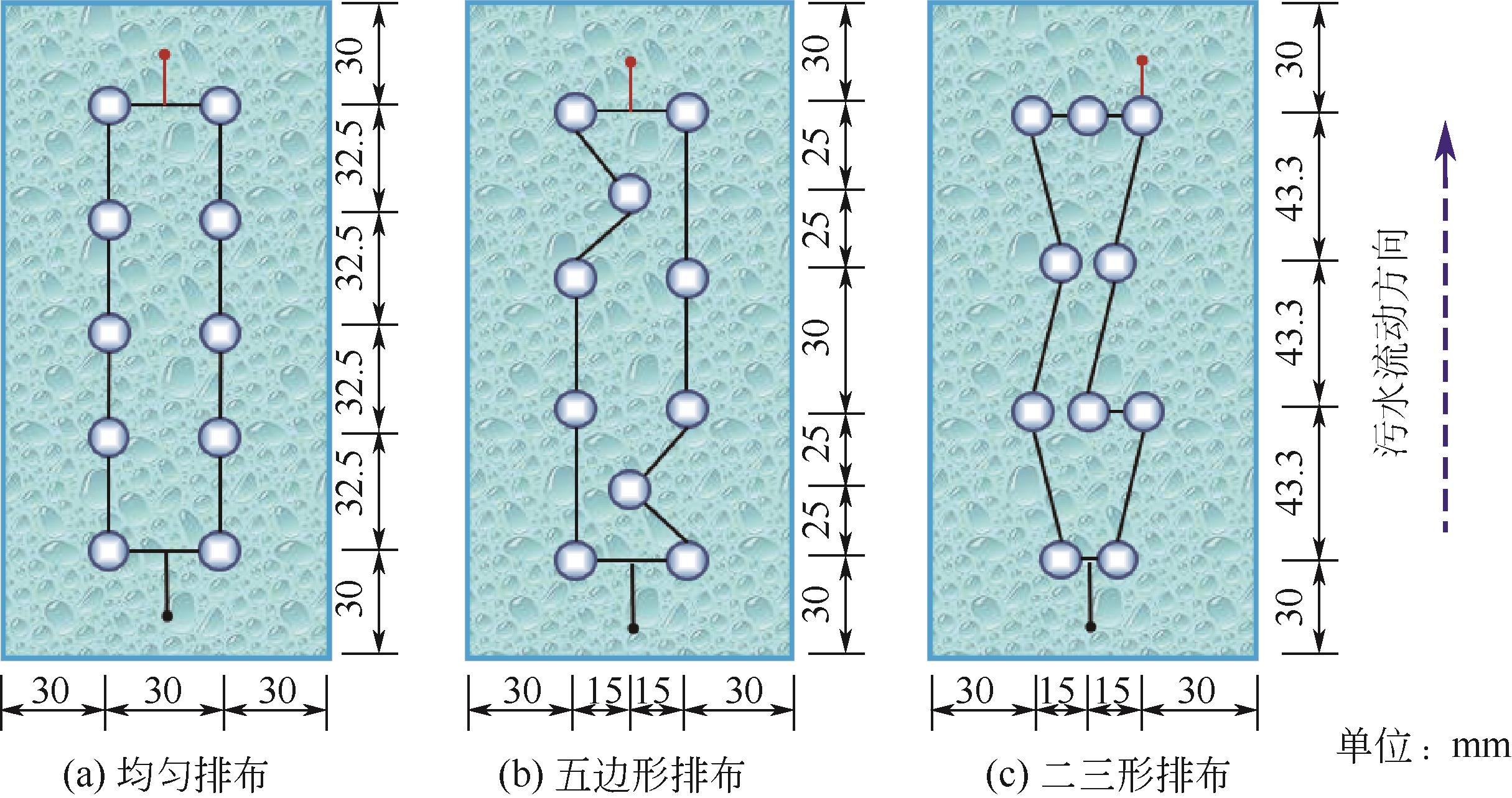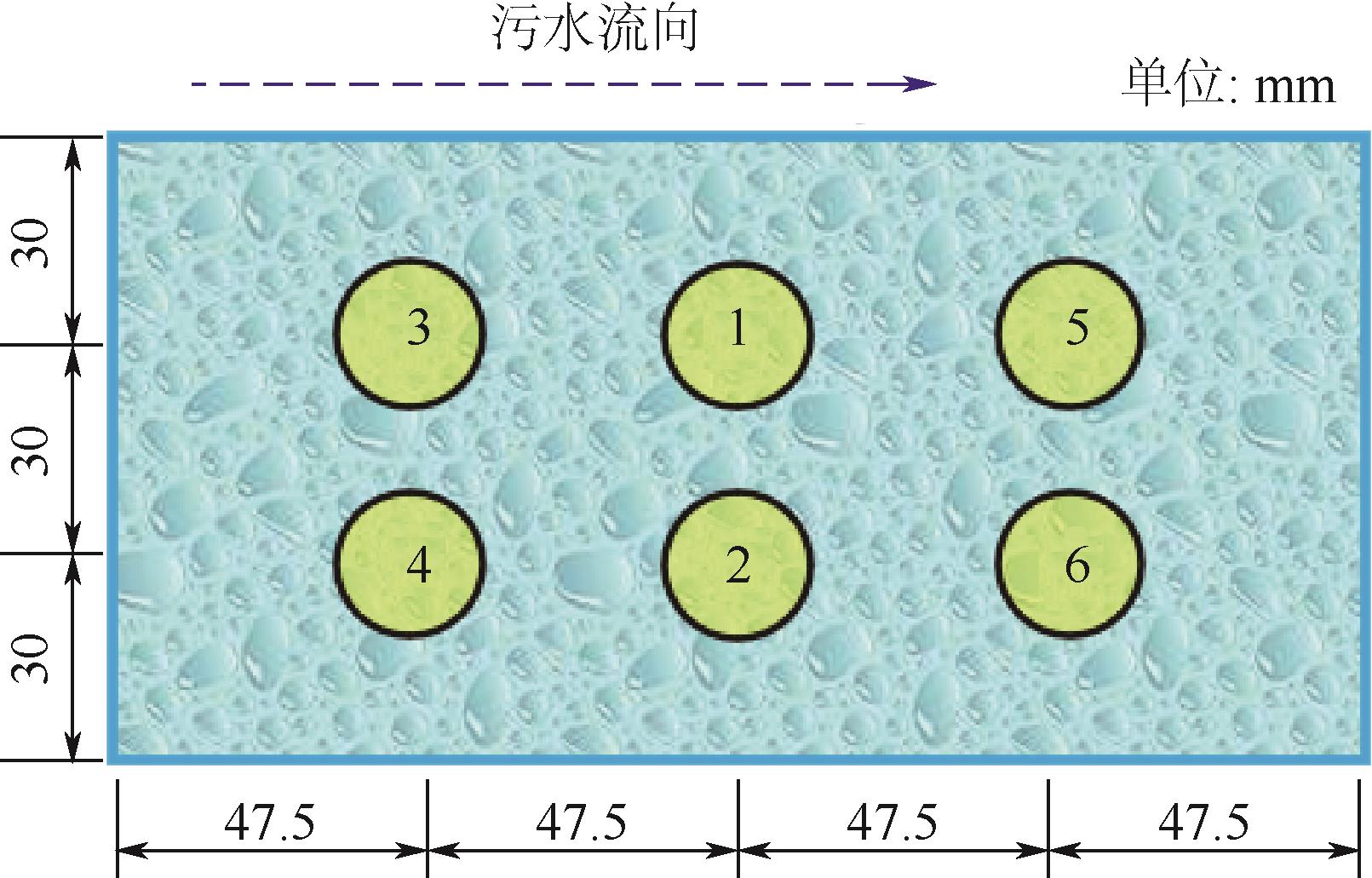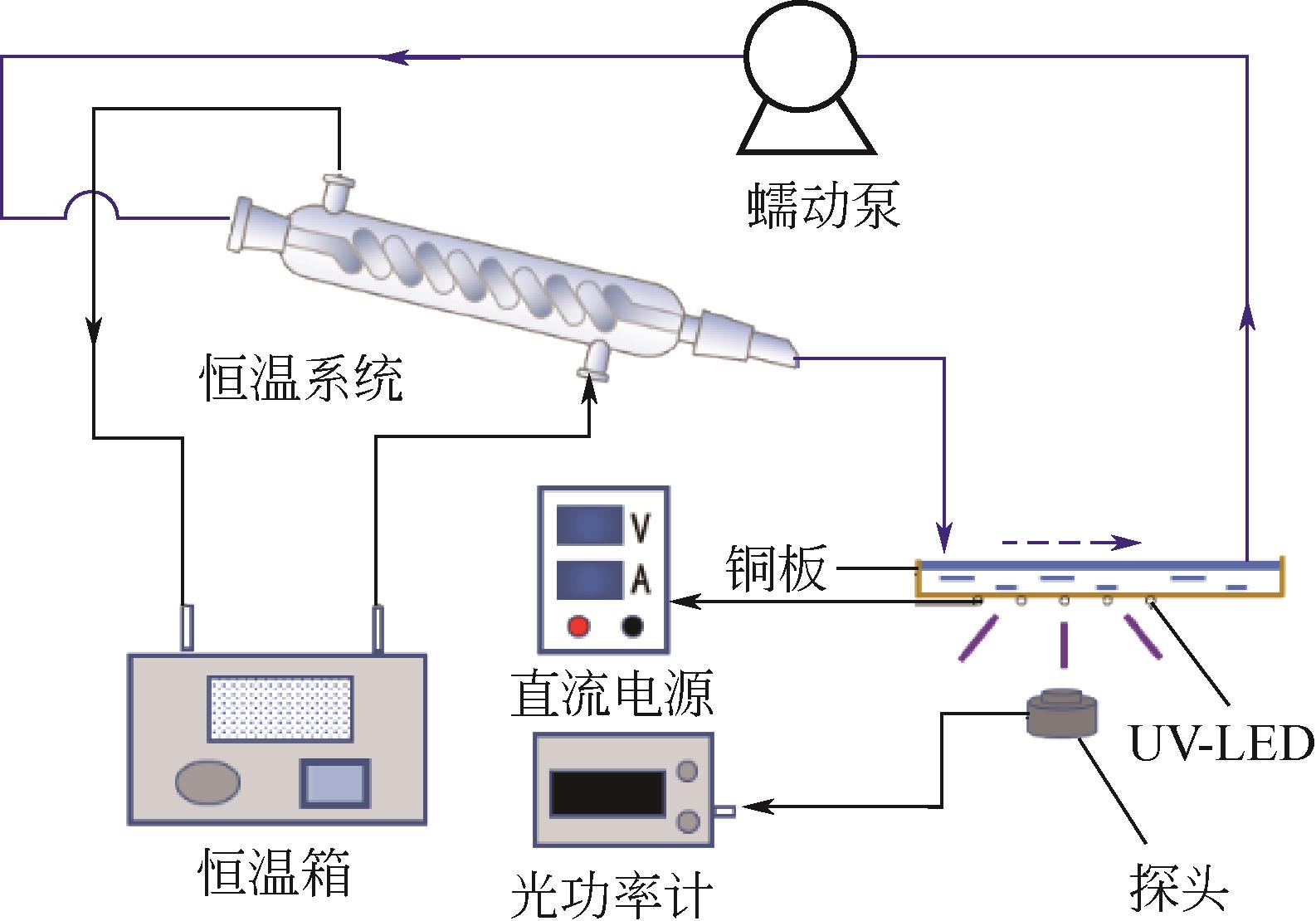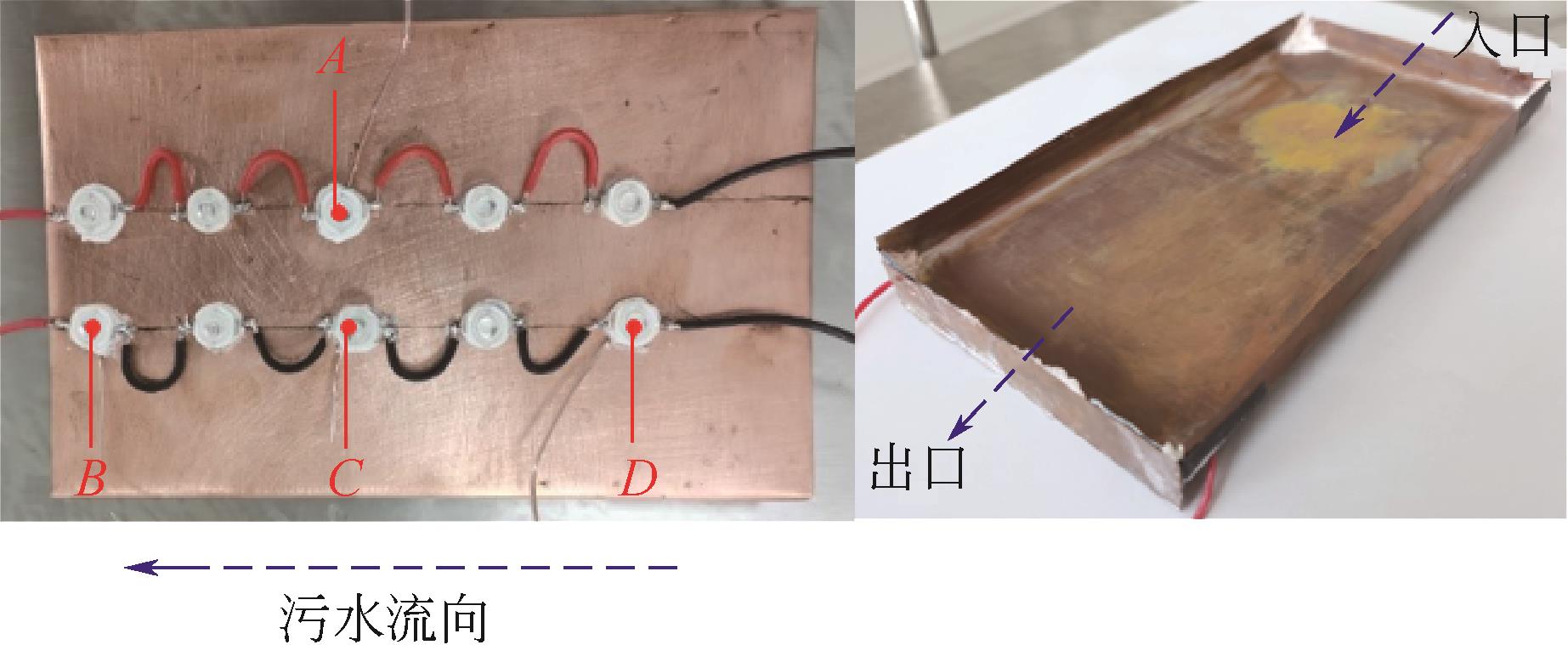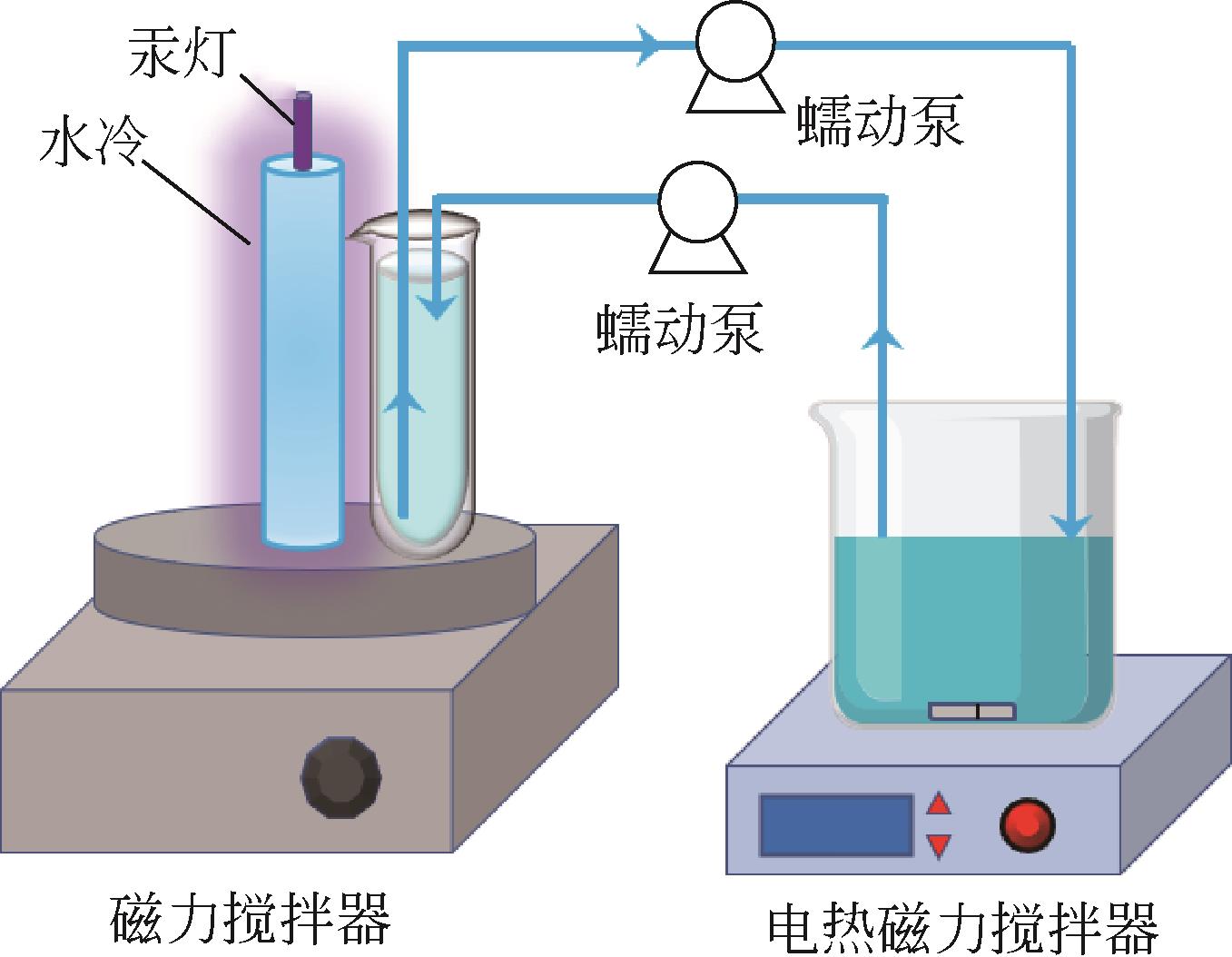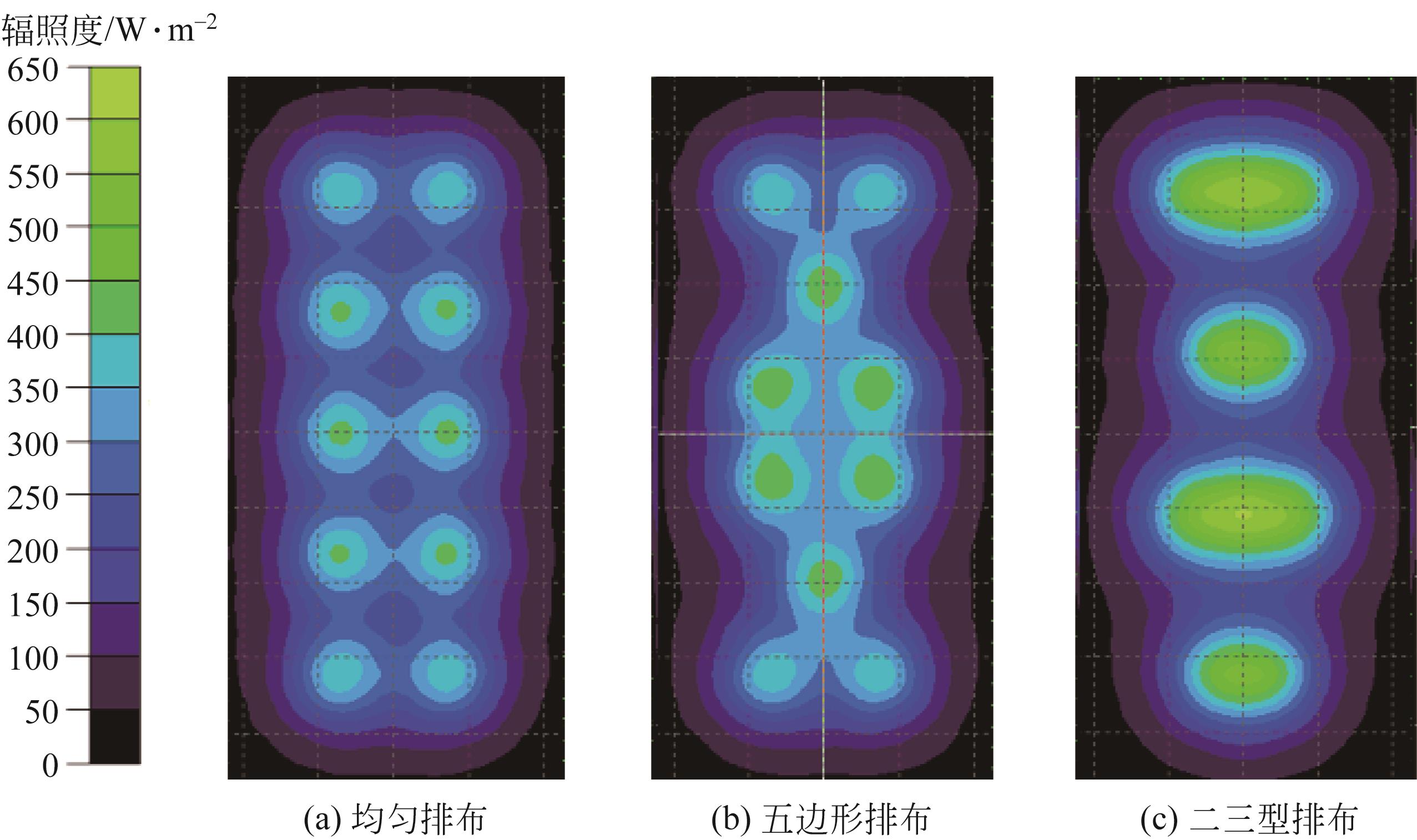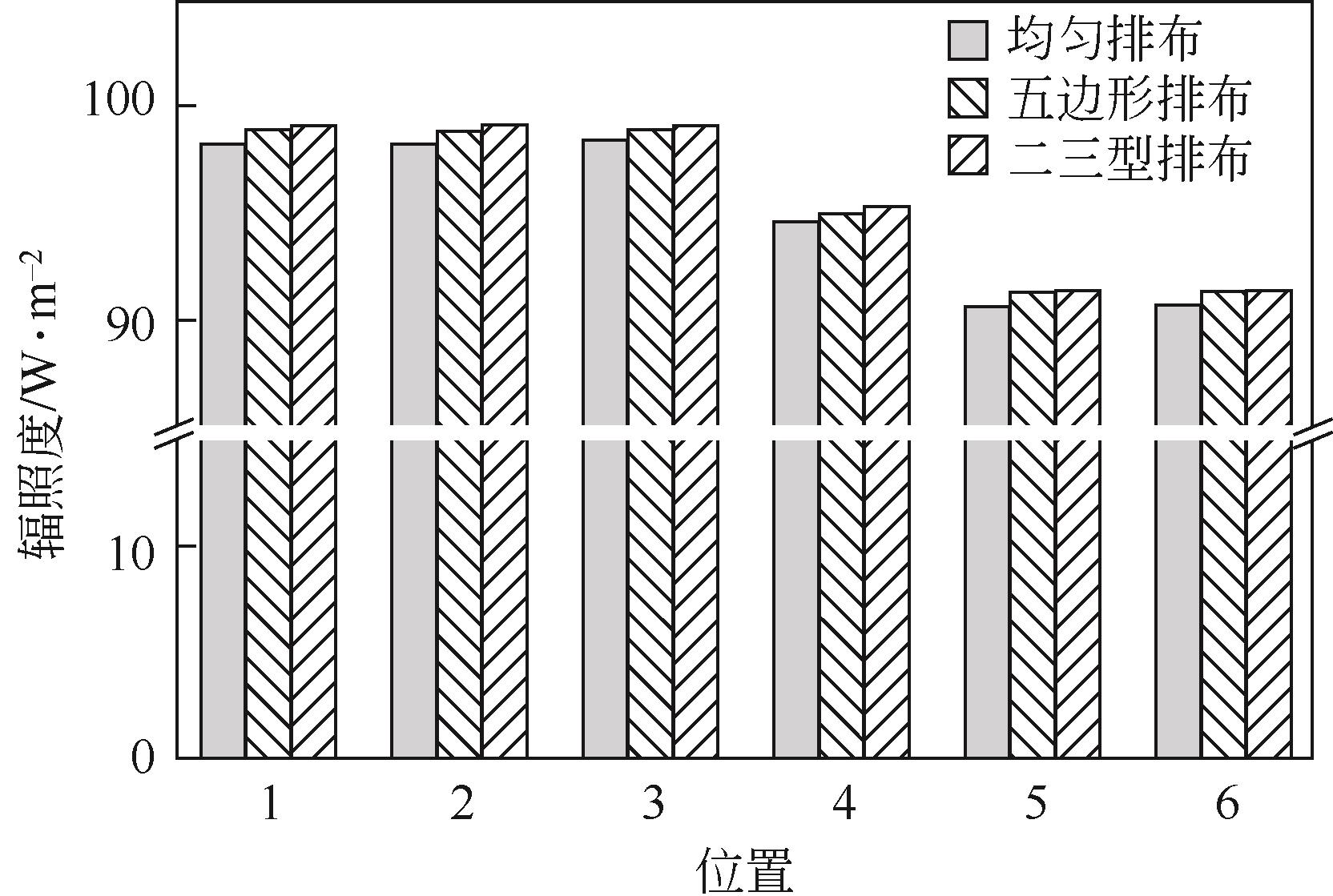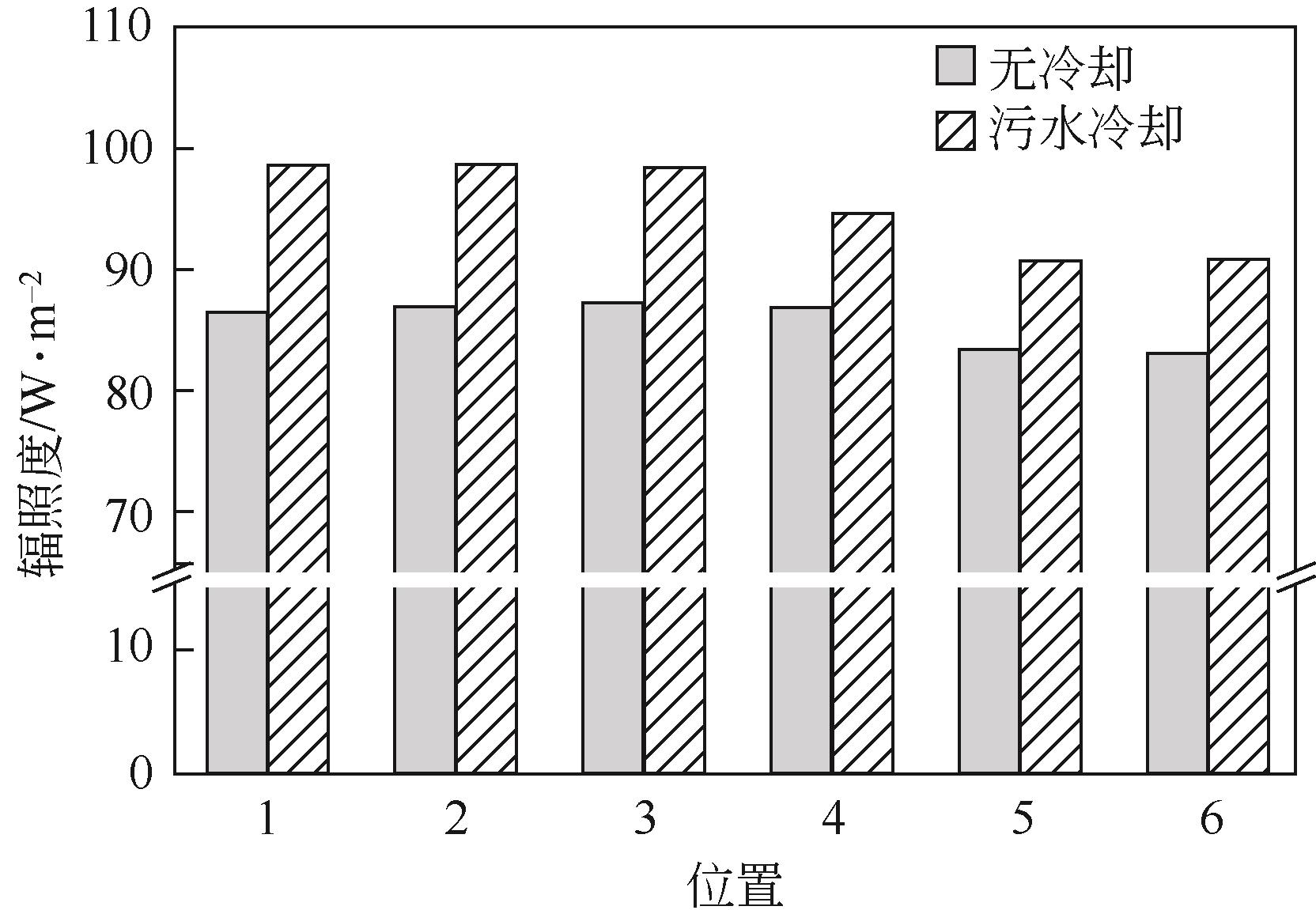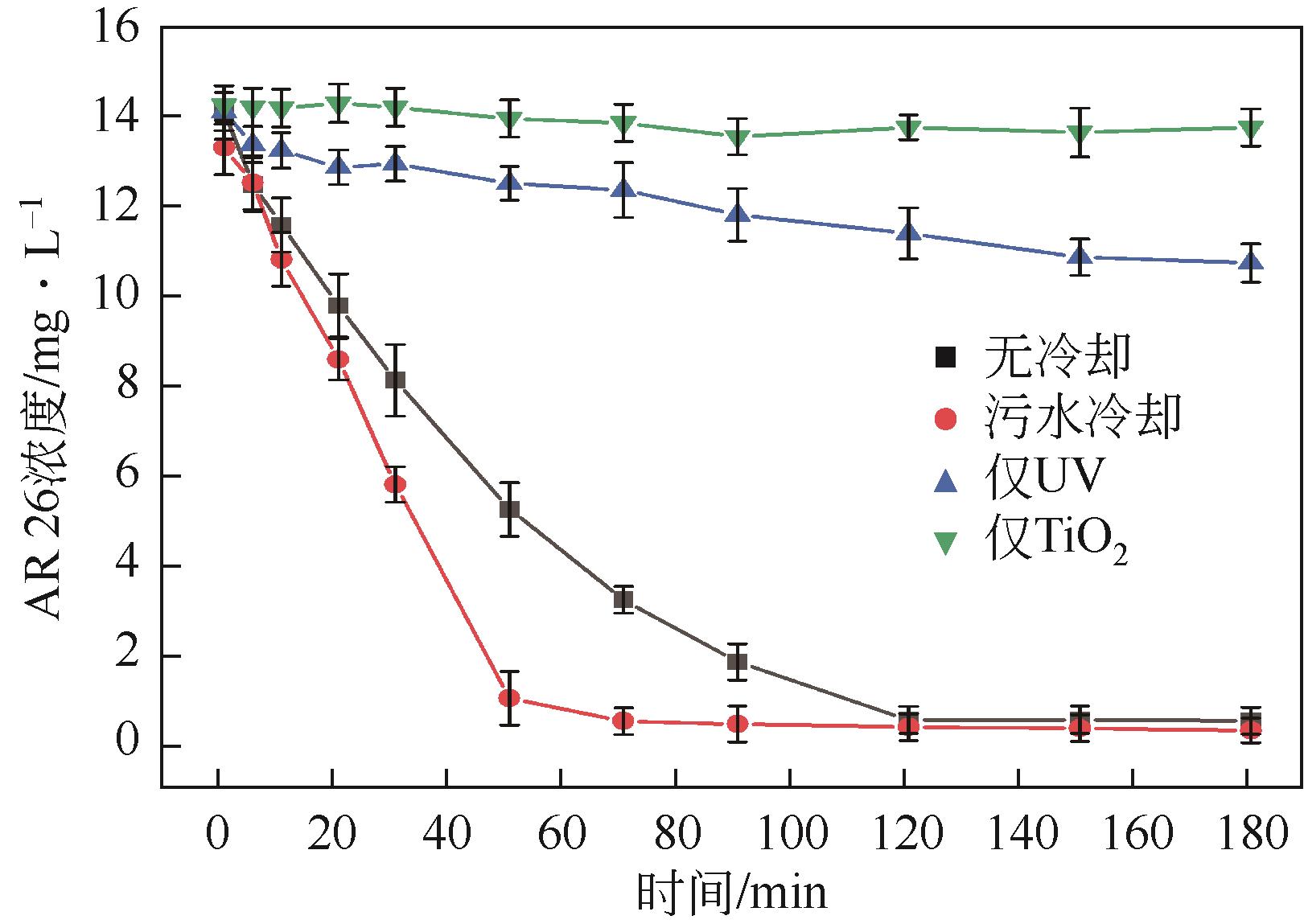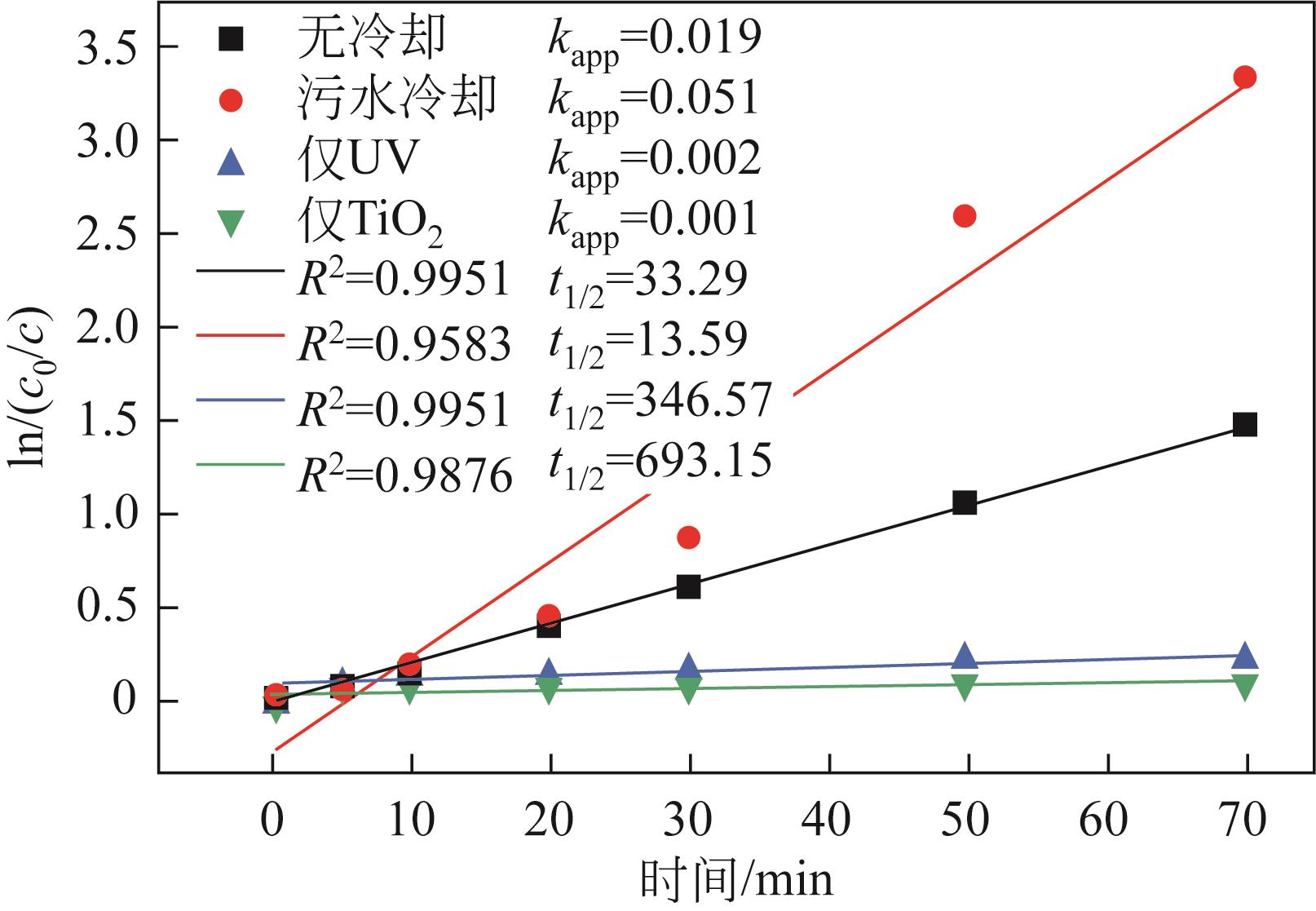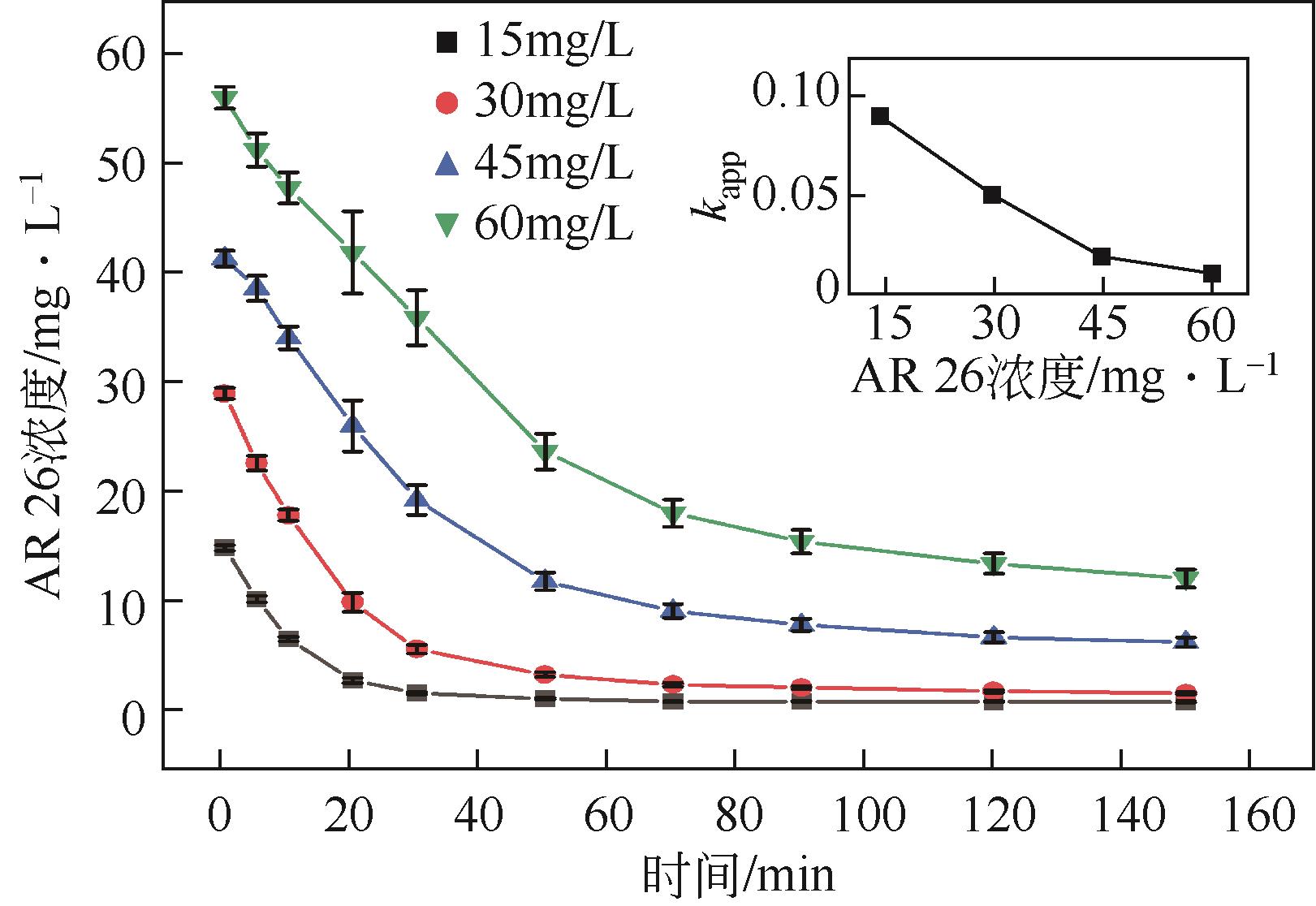Chemical Industry and Engineering Progress ›› 2023, Vol. 42 ›› Issue (9): 4905-4916.DOI: 10.16085/j.issn.1000-6613.2022-1920
• Resources and environmental engineering • Previous Articles Next Articles
Performance study of high power UV-LED heat dissipation and nano-TiO2 photocatalytic acid red 26 coupling system
WANG Chen1,3( ), BAI Haoliang1,3, KANG Xue2,3(
), BAI Haoliang1,3, KANG Xue2,3( )
)
- 1.School of Environment and Safety Engineering, North University of China, Taiyuan 030051, Shanxi, China
2.School of Chemistry and Chemical Engineering, North University of China, Taiyuan 030051, Shanxi, China
3.Dezhou Industrial Technology Research Institute of North University of China, Dezhou 253000, Shandong, China
-
Received:2022-10-17Revised:2022-12-26Online:2023-09-28Published:2023-09-15 -
Contact:KANG Xue
大功率UV-LED散热与纳米TiO2光催化酸性红26耦合系统性能
- 1.中北大学环境与安全工程学院,山西 太原 030051
2.中北大学化学与化工学院,山西 太原 030051
3.中北大学德州产业技术研究院,山东 德州 253000
-
通讯作者:康雪 -
作者简介:王晨(1987—),男,副教授,研究方向为高效散热技术。E-mail:chenwang87@nuc.edu.cn。 -
基金资助:国家自然科学基金(21908208);博士后第67批面上项目(2020M670659);山西省自然科学青年基金(201901D211224);山西省高校创新基金(2019L0575)
CLC Number:
Cite this article
WANG Chen, BAI Haoliang, KANG Xue. Performance study of high power UV-LED heat dissipation and nano-TiO2 photocatalytic acid red 26 coupling system[J]. Chemical Industry and Engineering Progress, 2023, 42(9): 4905-4916.
王晨, 白浩良, 康雪. 大功率UV-LED散热与纳米TiO2光催化酸性红26耦合系统性能[J]. 化工进展, 2023, 42(9): 4905-4916.
share this article
Add to citation manager EndNote|Ris|BibTeX
URL: https://hgjz.cip.com.cn/EN/10.16085/j.issn.1000-6613.2022-1920
| 排布方式 | 辐照度最大值/W∙m-2 | 辐照度平均值/W∙m-2 | 均匀度/% |
|---|---|---|---|
| 均匀排布 | 416.68 | 178.68 | 65.06 |
| 五边形排布 | 442.99 | 179.79 | 64.08 |
| 二三形排布 | 603.65 | 180.24 | 37.54 |
| 排布方式 | 辐照度最大值/W∙m-2 | 辐照度平均值/W∙m-2 | 均匀度/% |
|---|---|---|---|
| 均匀排布 | 416.68 | 178.68 | 65.06 |
| 五边形排布 | 442.99 | 179.79 | 64.08 |
| 二三形排布 | 603.65 | 180.24 | 37.54 |
| 1 | 李春庚, 甄新, 李亚丽, 等. 印染废水染料降解技术研究进展[J]. 应用化工, 2022, 51(5): 1439-1444. |
| LI Chungeng, ZHEN Xin, LI Yali, et al. Advances in dye degradation technology of printing and dyeing wastewater[J]. Applied Chemical Industry, 2022, 51(5): 1439-1444. | |
| 2 | 姜金宏, 何席伟, 熊晓敏, 等. 纺织印染废水毒性特征与控制技术研究进展[J]. 工业水处理, 2021, 41(6): 77-87. |
| JIANG Jinhong, HE Xiwei, XIONG Xiaomin, et al. Research progress on toxicity characteristics and control technologies of textile dyeing wastewater[J]. Industrial Water Treatment, 2021, 41(6): 77-87. | |
| 3 | DOS SANTOS A B, CERVANTES F J, VAN LIER J B. Review paper on current technologies for decolourisation of textile wastewaters: Perspectives for anaerobic biotechnology[J]. Bioresource Technology, 2007, 98(12): 2369-2385. |
| 4 | 任南琪, 周显娇, 郭婉茜, 等. 染料废水处理技术研究进展[J]. 化工学报, 2013, 64(1): 84-94. |
| REN Nanqi, ZHOU Xianjiao, GUO Wanqian, et al. A review on treatment methods of dye wastewater[J]. CIESC Journal, 2013, 64(1): 84-94. | |
| 5 | SRINIVASAN S, SADASIVAM S K. Exploring docking and aerobic-microaerophilic biodegradation of textile azo dye by bacterial systems[J]. Journal of Water Process Engineering, 2018, 22: 180-191. |
| 6 | CAO C H, XIAO L, CHEN C H, et al. In situ preparation of magnetic Fe3O4/chitosan nanoparticles via a novel reduction-precipitation method and their application in adsorption of reactive azo dye[J]. Powder Technology, 2014, 260: 90-97. |
| 7 | BAYRAMOĞLU G, YAKUP ARıCA M. Biosorption of benzidine based textile dyes “Direct Blue 1 and Direct Red 128” using native and heat-treated biomass of Trametes versicolor [J]. Journal of Hazardous Materials, 2007, 143(1/2): 135-143. |
| 8 | IMRAN M, ARSHAD M, NEGM F, et al. Yeast extract promotes decolorization of azo dyes by stimulating azoreductase activity in Shewanella sp. strain IFN4 [J]. Ecotoxicology and Environmental Safety, 2016, 124: 42-49. |
| 9 | BU J Q, YUAN L, ZHANG N, et al. High-efficiency adsorption of methylene blue dye from wastewater by a thiosemicarbazide functionalized graphene oxide composite[J]. Diamond and Related Materials, 2020, 101: 107604. |
| 10 | THABEDE P M, DAVID SHOOTO N, NAIDOO E B. Removal of methylene blue dye and lead ions from aqueous solution using activated carbon from black cumin seeds[J]. South African Journal of Chemical Engineering, 2020, 33: 39-50. |
| 11 | 贾艳萍, 张真, 佟泽为, 等. 铁碳微电解处理印染废水的效能及机理研究[J]. 化工学报, 2020, 71(4): 1791-1801. |
| JIA Yanping, ZHANG Zhen, TONG Zewei, et al. Study on efficiency and mechanism of iron-carbon microelectrolysis treatment of dyeing wastewater[J]. CIESC Journal, 2020, 71(4): 1791-1801. | |
| 12 | GHANBARI F, MORADI M. A comparative study of electrocoagulation, electrochemical Fenton, electro-Fenton and peroxi-coagulation for decolorization of real textile wastewater: Electrical energy consumption and biodegradability improvement[J]. Journal of Environmental Chemical Engineering, 2015, 3(1): 499-506. |
| 13 | CHIU Y H, CHANG T F, CHEN C Y, et al. Mechanistic insights into photodegradation of organic dyes using heterostructure photocatalysts[J]. Catalysts, 2019, 9(5): 430. |
| 14 | CHANDRABOSE G, DEY A, GAUR S S, et al. Removal and degradation of mixed dye pollutants by integrated adsorption-photocatalysis technique using 2-D MoS2/TiO2 nanocomposite[J]. Chemosphere, 2021, 279: 130467. |
| 15 | KUMARAN V, SUDHAGAR P, KONGA A, et al. Photocatalytic degradation of synthetic organic reactive dye wastewater using GO-TiO2 nanocomposite[J]. Polish Journal of Environmental Studies, 2020, 29(2): 1683-1690. |
| 16 | DU F Q, YANG D M, KANG T X, et al. SiO2/Ga2O3 nanocomposite for highly efficient selective removal of cationic organic pollutant via synergistic electrostatic adsorption and photocatalysis[J]. Separation and Purification Technology, 2022, 295: 121221. |
| 17 | 李晋闽, 闫建昌, 郭亚楠, 等. 紫外LED研究进展[J]. 科技导报, 2021, 39(14): 30-41. |
| LI Jinmin, YAN Jianchang, GUO Yanan, et al. Recent progress of ultraviolet light-emitting diodes[J]. Science & Technology Review, 2021, 39(14): 30-41. | |
| 18 | SONG K, MOHSENI M, TAGHIPOUR F. Application of ultraviolet light-emitting diodes (UV-LEDs) for water disinfection: A review[J]. Water Research, 2016, 94: 341-349. |
| 19 | ESKANDARIAN M R, FAZLI M, RASOULIFARD M H, et al. Decomposition of organic chemicals by zeolite-TiO2 nanocomposite supported onto low density polyethylene film under UV-LED powered by solar radiation[J]. Applied Catalysis B: Environmental, 2016, 183: 407-416. |
| 20 | ZHU L, CUI L Y, HUANG Q W, et al. Performance study of SOL&PID system for the degradation of Acid Red 26 and 4-chlorophenol[J]. Energy Conversion and Management, 2017, 136: 361-371. |
| 21 | LIANG R, VAN LEUWEN J C, BRAGG L M, et al. Utilizing UV-LED pulse width modulation on TiO2 advanced oxidation processes to enhance the decomposition efficiency of pharmaceutical micropollutants[J]. Chemical Engineering Journal, 2019, 361: 439-449. |
| 22 | SHENAI K, DUDLEY M, DAVIS R F. Current status and emerging trends in wide bandgap (WBG) semiconductor power switching devices[J]. ECS Journal of Solid State Science and Technology, 2013, 2(8): N3055-N3063. |
| 23 | CHENG T, LUO X B, HUANG S Y, et al. Thermal analysis and optimization of multiple LED packaging based on a general analytical solution[J]. International Journal of Thermal Sciences, 2010, 49(1): 196-201. |
| 24 | NARENDRAN N, GU Y, FREYSSINIER J P, et al. Solid-state lighting: Failure analysis of white LEDs[J]. Journal of Crystal Growth, 2004, 268(3/4): 449-456. |
| 25 | KALBASI R. Introducing a novel heat sink comprising PCM and air—Adapted to electronic device thermal management[J]. International Journal of Heat and Mass Transfer, 2021, 169: 120914. |
| 26 | XU Z. Heat transfer performance of the rectangular heat sinks with non-uniform height thermosyphons for high power LED lamps cooling[J]. Case Studies in Thermal Engineering, 2021, 25: 101013. |
| 27 | WANG Z B, ZHANG J, LIU Y C, et al. Study on the water cooling technology for the high power LED array[C]//2013 Third International Conference on Instrumentation, Measurement, Computer, Communication and Control. Shenyang: IEEE, 2014: 1289-1292. |
| 28 | WAN Z M, LIU J, SU K L, et al. Flow and heat transfer in porous micro heat sink for thermal management of high power LEDs[J]. Microelectronics Journal, 2011, 42(5): 632-637. |
| 29 | NOVAK V, ABDEL-KHALIK S I, SADOWSKI D L, et al. Investigation of mist cooling for the Electra KrF laser hibachi[J]. Fusion Science and Technology, 2007, 52(3): 483-488. |
| 30 | 陈萨如拉, 朱丽, 孙勇. 高热流密度器件散热技术的研究进展[J]. 流体机械, 2015,43(5): 39-45. |
| CHEN Sarula, ZHU Li, SUN Yong. Research progress of cooling technologies for high heat flux density devices[J]. Fluid Machinery, 2015, 43(5): 39-45. | |
| 31 | 倪笠, 崔晓钰, 马柯. 大功率UV-LED固化灯水冷散热器[J]. 光电子技术, 2016,36(2): 130-134. |
| NI Li, CUI Xiaoyu, MA Ke. A liquid cold plate for high power UV-LED curing lamps[J]. Optoelectronic Technology, 2016, 36(2): 130-134. | |
| 32 | KANG X, WANG Y P, HUANG Q W, et al. Phase-change immersion cooling high power light emitting diodes and heat transfer improvement[J]. Microelectronics Reliability, 2017, 79: 257-264. |
| 33 | CUI L Y, ZHU L, HUANG Q W, et al. Performance analysis of a solar photochemical photovoltaic hybrid system for decolorization of Acid Red 26 (AR 26)[J]. Energy, 2017, 127: 209-217. |
| 34 | KIM L, CHOI J H, JANG S H, et al. Thermal analysis of LED array system with heat pipe[J]. Thermochimica Acta, 2007, 455(1/2): 21-25. |
| 35 | YANG K S, LIN C C, SHYU J C, et al. Performance and two-phase flow pattern for micro flat heat pipes[J]. International Journal of Heat and Mass Transfer, 2014, 77: 1115-1123. |
| 36 | CHEN J, OLLIS D F, RULKENS W H, et al. Kinetic processes of photocatalytic mineralization of alcohols on metallized titanium dioxide[J]. Water Research, 1999, 33(5): 1173-1180. |
| 37 | LIN H W, ZHANG K, YANG G L, et al. Ultrafine nano 1T-MoS2 monolayers with NiO x as dual co-catalysts over TiO2 photoharvester for efficient photocatalytic hydrogen evolution[J]. Applied Catalysis B: Environmental, 2020, 279: 119387. |
| 38 | American National Standard Institute, Inc. Electronic projection-fixed resolution projectors: [S]. New York: National Association of Photographic Manufacture, Inc, 1997. |
| 39 | JALLOULI N, PASTRANA-MARTÍNEZ L M, RIBEIRO A R, et al. Heterogeneous photocatalytic degradation of ibuprofen in ultrapure water, municipal and pharmaceutical industry wastewaters using a TiO2/UV-LED system[J]. Chemical Engineering Journal, 2018, 334: 976-984. |
| 40 | PARK S J, JANG D, YOOK S J, et al. Optimization of a chimney design for cooling efficiency of a radial heat sink in a LED downlight[J]. Energy Conversion and Management, 2016, 114: 180-187. |
| 41 | 谢倩雯. 温度对LED性能的影响[J]. 物联网技术, 2012, 2(3): 37-38, 41. |
| XIE Qianwen. The influence of temperature on the function of LED[J]. Internet of Things Technologies, 2012, 2(3): 37-38, 41. | |
| 42 | HOFFMANN M R, MARTIN S T, CHOI W, et al. Environmental applications of semiconductor photocatalysis[J]. Chemical Reviews, 1995, 95(1): 69-96. |
| 43 | QI S Y, LIU X T, ZHANG R Y, et al. Preparation and photocatalytic properties of g-C3N4/BiOCl heterojunction[J]. Inorganic Chemistry Communications, 2021, 133: 108907. |
| 44 | TUNESI S, ANDERSON M. Influence of chemisorption on the photodecomposition of salicylic acid and related compounds using suspended titania ceramic membranes[J]. The Journal of Physical Chemistry, 1991, 95(8): 3399-3405. |
| 45 | 全学军, 杨露, 程治良, 等. 偶氮染料在气-液-固循环浆态光催化反应器中的降解脱氮[J]. 化工学报, 2010, 61(11): 2829-2835. |
| QUAN Xuejun, YANG Lu, CHENG Zhiliang, et al. Degradation and nitrogen removal of azo dye in gas-liquid-solid circulating slurry photocatalytic reactor[J]. CIESC Journal, 2010, 61(11): 2829-2835. |
| [1] | XU Chunshu, YAO Qingda, LIANG Yongxian, ZHOU Hualong. Research progress on functionalization strategies of covalent organic frame materials and its adsorption properties for Hg(Ⅱ) and Cr(Ⅵ) [J]. Chemical Industry and Engineering Progress, 2023, 42(S1): 461-478. |
| [2] | SUN Yuyu, CAI Xinlei, TANG Jihai, HUANG Jingjing, HUANG Yiping, LIU Jie. Optimization and energy-saving of a reactive distillation process for the synthesis of methyl methacrylate [J]. Chemical Industry and Engineering Progress, 2023, 42(S1): 56-63. |
| [3] | LIU Xuanlin, WANG Yikai, DAI Suzhou, YIN Yonggao. Analysis and optimization of decomposition reactor based on ammonium carbamate in heat pump [J]. Chemical Industry and Engineering Progress, 2023, 42(9): 4522-4530. |
| [4] | HUANG Yufei, LI Ziyi, HUANG Yangqiang, JIN Bo, LUO Xiao, LIANG Zhiwu. Research progress on catalysts for photocatalytic CO2 and CH4 reforming [J]. Chemical Industry and Engineering Progress, 2023, 42(8): 4247-4263. |
| [5] | GUO Lixing, PANG Weiying, MA Keyao, YANG Jiahan, SUN Zehui, ZHANG Pan, FU Dong, ZHAO Kun. Hierarchically multilayered TiO2 with spatial pore-structure for efficient photocatalytic CO2 reduction [J]. Chemical Industry and Engineering Progress, 2023, 42(7): 3643-3651. |
| [6] | LI Lanyu, HUANG Xinye, WANG Xiaonan, QIU Tong. Reflection and prospects on the intelligent transformation of chemical engineering research [J]. Chemical Industry and Engineering Progress, 2023, 42(7): 3325-3330. |
| [7] | XUE Kai, WANG Shuai, MA Jinpeng, HU Xiaoyang, CHONG Daotong, WANG Jinshi, YAN Junjie. Planning and dispatch of distributed integrated energy systems for industrial parks [J]. Chemical Industry and Engineering Progress, 2023, 42(7): 3510-3519. |
| [8] | XU Wei, LI Kaijun, SONG Linye, ZHANG Xinghui, YAO Shunhua. Research progress of photocatalysis and co-electrochemical degradation of VOCs [J]. Chemical Industry and Engineering Progress, 2023, 42(7): 3520-3531. |
| [9] | YANG Hongmei, GAO Tao, YU Tao, QU Chengtun, GAO Jiapeng. Treatment of refractory organics sulfonated phenolic resin with ferrate [J]. Chemical Industry and Engineering Progress, 2023, 42(6): 3302-3308. |
| [10] | GU Shiya, DONG Yachao, LIU Linlin, ZHANG Lei, ZHUANG Yu, DU Jian. Design and optimization of pipeline system for carbon capture considering intermediate nodes [J]. Chemical Industry and Engineering Progress, 2023, 42(6): 2799-2808. |
| [11] | ZHANG Ning, WU Haibin, LI Yu, LI Jianfeng, CHENG Fangqin. Recent advances in preparation and application of floating photocatalysts in water treatment [J]. Chemical Industry and Engineering Progress, 2023, 42(5): 2475-2485. |
| [12] | LI Xue, WANG Yanjun, WANG Yuchao, TAO Shengyang. Recent advances in bionic surfaces for fog collection [J]. Chemical Industry and Engineering Progress, 2023, 42(5): 2486-2503. |
| [13] | YANG Zhuang, LI Runhua, QIANG Zengshou, WANG Yajun, YAO Wenqing. Photocatalytic degradation of waste refrigerant R134a [J]. Chemical Industry and Engineering Progress, 2023, 42(4): 2109-2114. |
| [14] | SUN Xiao, ZHU Guangtao, PEI Aiguo. Industrialization and research progress of hydrogen liquefier [J]. Chemical Industry and Engineering Progress, 2023, 42(3): 1103-1117. |
| [15] | ZOU Yincai, LI Qingguo, WU Hui, ZHONG Xiaobing, CHEN Xianzhi. Heat transfer simulation and optimization of missile borne phase change heat sink [J]. Chemical Industry and Engineering Progress, 2023, 42(3): 1248-1256. |
| Viewed | ||||||
|
Full text |
|
|||||
|
Abstract |
|
|||||

